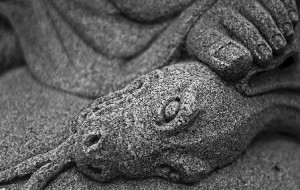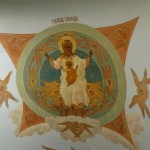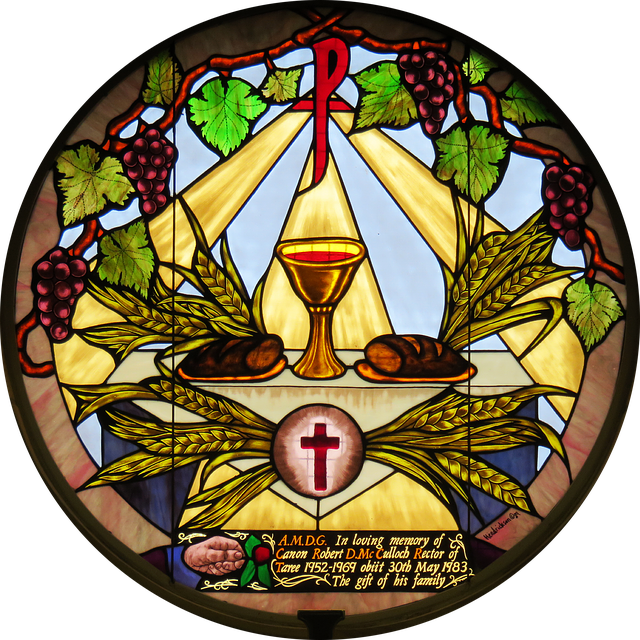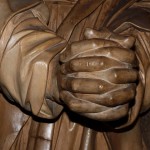If you’re new to my Sermon Notes, you can read about why I prepare them here. They aren’t just for preachers, they’re for everyone!
Thesis
As I read through these lessons over and over there were two themes that jumped out at me: sin and promise. It is really just one theme with two sides but that’s ok!
Everything points back and away from Genesis 3, in my opinion. We are entering into Ordinary Time—sure, we’ve been there since Pentecost but now we have our first “clean” Sunday after Pentecost—and it means that we are afforded the opportunity to disciple and instruct our people. This Sunday therefore begins with the retelling of our sin through Adam and Eve and the curse and consequences of those actions. We also start with the promise, the proto evangelion, that sin won’t have the last word.
In the Psalm we see the Psalmist crying out from the depth of his (or her) sin and clings to the promise that YHWH will come and deliver. Paul’s second epistle to the Corinthians juxtaposes the passing away of the outer man (not a reference to physical death but to Paul’s outward existence) and the “weight of glory” found in Christ and new life in him. We don’t need to worry temporary persecution because Jesus is resurrected and we will be raised with him to glory. Finally, we get to the gospel lesson and this is one of Mark’s more difficult pericopes. However, it is clear from the opening interaction that Jesus is accused of being in league with the devil. How can that be? How can a house divided against itself stand strong? Of course Jesus isn’t in league with the devil, with the prince of darkness! Jesus is the offspring of Eve who will stamp on the serpents head! Jesus is the promised one who will bring life, salvation, and redemption to Israel!
Sin and promise. We need to deal with the weightiness of our sins but also recognize that it is far outdone by the weight of God’s glory! We cannot properly enter into discipleship without first recognizing our need for a savior and for justification, sanctification and glorification. Let your people feel the weight of God’s glory in light of our sin!
Analysis
Collect
O God, from whom all good proceeds: Grant that by your inspiration we may think those things that are right, and by your merciful guiding may do them; through Jesus Christ our Lord, who lives and reigns with you and the Holy Spirit, one God, for ever and ever. Amen.
Think and do. Inspire and guide. Our actions are always a response to the first action of the triune God. Our thoughts are first inspired and then our actions mercifully granted by God. We cannot do anything to please God or to earn his love, and we cannot move toward him first or cause him to look at us. He already loves us, he has already drawn close to us and he is already looking at us.
Let us return to the first line and let us also return to the material from James K.A. Smith that I have now used on two occasions for sermon notes. All good proceeds from God because He is the Good. Not only that, but he is that good that we all desire. That is, we desired Him above all else until the sin of Adam.
Our desire is not in a vacuum. All desire has an object. Human desire began in creation and the only object of our desire was God; this is as it should be. However, with sin our desire became misdirected, unaligned, disordered and instead of God we found other objects and things toward which we point our desire.
Desire here is much more than affection it. It is kardias, our gut (or core) love. Through the work and person of Jesus Christ our desires can again be ordered toward God and that is the main sentiment of this collect: taming and ordering our unruly desires. To love God’s commands and to desire his promises is indeed to be a covenant-member of his family, a kingdom citizen of his already inaugurated but not yet consummated kingdom. And it is this coming Kingdom—the new heavens and the new earth—when God shall be all in all—where our true desires should be fixed.
We are not primarily thinkers or doers but lovers. When we love God we are able to think and do rightly. I know that the Collect doesn’t mention love but I do believe that divine love undergirds all that we are and all that we do. So again I ask you: what do you desire above all else? Where is your love directed? For unless we allow God to direct our love back to him then our thoughts and actions would be to his glory.
Old Testament – Genesis 3:8-15
We enter this fatal story as it is already in motion. The serpent has already tempted and twisted God’s words. Adam and Even have already eaten the fruit of the tree. Our text picks up with the shame and fear felt by the two protagonists, God’s inquiry and “discovery” of the sin, and finally his words of curse to the serpent. You have two options here: 1) You can make it “easier” on yourself and include verses 1-7 as part of your OT reading because they fit with the Collect. 2) You can take the lectionary at face value and stick with verses 8-15 and figure out what this all means. I suggest you take the second option.
God was walking in the garden—the language here suggests that this was not the first time God had done this—and Adam and Eve choose to hide from him due to their shame. Up to this point, Adam and Eve had enjoyed perfect harmony and koinonia with God, each other, and creation. Before the Fall there had been no fear, or shame, or sin, or disruption of relationship. So for Adam and Eve (the creatures) to hide from God (the Creator) from whom their entire existence flowed is a big deal.
God doesn’t leave Adam and Eve to their own devices or alone to hid forever. God seeks after his creation and begins calling out to them. Adam is at least honest about why they hid from God: they were afraid of him and they were naked. These two are two shocking revelations because without the fruit of the tree Adam would not have known either fear or nakedness. He had a secure existence in which the Creator provided him everything, but something went wrong.
Obviously God already knew what had taken place and the answer to all of his questions because he is omniscient and all-powerful, but God’s knowledge doesn’t get us off of the hook for confession and honesty. Unfortunately we see the first instance in the blame game: Adam blames “the woman you gave me” and Eve blames the serpent. Neither is able to own up to their sin. How often do we blame someone else, something else, or even God for our own sinful behavior? How often do we shift the focus from our own twisted or corrupt desires onto a circumstance or situation that would lessen our guilt? The story of Adam and Eve is the story of each one of us; it is the story of the human heart that searches for meaning, goodness, and love outside of God. As we find out in the portion of chapter 3 that takes place after our reading, the result of their sin is bad: they are kicked out of the garden, they are told that childbirth will be painful and it will be toilsome to work the earth, but we also find out that this is not the last word…
God will have the last word over the serpent, over sin, and over death. Beyond the fact that he curses the serpent to slithering on the ground we are given a ray of hope. Genesis 3:15 is known as the proto evangelion, it is the first promise that God will put things to rights. Speaking to the serpent, God promises that there will be a conflict between the serpent and the woman’s offspring: the serpent will strike the heel but the offspring will strike the head. God had a plan. In fact, God’s plan was always the same plan: he would have total victory over the forces of darkness, sin, suffering and death through the offspring of Adam and Eve. Even in the middle of our darkest hour in the Garden of Even there is hope. Even when our sins are bearing down on us, or better, even when we are choosing to abound in sin there is still hope.
But do you have it?
Do you read Genesis 3 as punishment or hope?
Psalm 130
We again encounter Psalm 130 in the lectionary. Normally “reserved” for use during Lent, Psalm 130 is a cry for deliverance for sin and a proclamation of trust in God. We now find this Psalm in the season after Pentecost and while the “meaning” of the Psalm will not change, our use and understanding of it certainly should.
Psalm 130 is a personal favorite of mine. Martin Luther took the words of Psalm 130 and set them to beautiful music in the sixteenth century. The text to this Psalm is pretty straightforward in meaning. Let’s break it down for a minute:
- The Psalmist grows to God from the depths (of his woe) and asks that his prayers be heard
- If God were to hold our sins against us then who could stand before him?
- There is forgiveness with God
- The Psalmist waits for God
- The Psalmist waits as a watchman does for the morning
- The Psalmist implores Israel to wait for God as well
- There is promise of redemption and forgiveness of sins with God
There is no hidden meaning to this Psalm. However, it is a “difficult” Psalm because how many of us can make the claim that we are crying out to God from the depths of our woe? How many of us can say that we truly trust in God and are watching for him like a watchman does for the morning?
The “depths of woe” ought to be interpreted with the many references to sin throughout Psalm 130. The Psalmist isn’t blaming his or her woe on someone or something else like Adam and Eve. No, this is a cry for help from the darkness of one’s sins.
Likewise, watching for the morning is not a passive form of watching. I wrote this for Holy Saturday and I think the whole post is worth a read as you wade through Psalm 130. I wrote:
Today I’m singing with Martin Luther with the words of his hymn composed from Psalm 130: “What though I wait the live-long night, And til the dawn appeareth, My heart still trusteth in His might; It doubteth not nor feareth; Do thus, O ye of Israel’s seed, Ye of the Spirit born indeed; And wait til God appeareth.” The NRSV version of Psalm 130 recounts an active waiting that is more “than those who watch for the morning.” This song is full of yearning, of longing, of an anticipation that the night will end and the eternal sun will shine.
While this was composed specifically for Holy Saturday (in 2015) and actively waiting for the resurrection, I believe the post—and more importantly Psalm 130—it applicable to Ordinary Time as we await the return of the King. We “await his coming in glory” and this is how we do it: through an active waiting, a longing that calls us to action, and a yearning that drives us toward good deeds. We wait while still in motion.
Epistle – 2 Corinthians 4:13-5:1
The lectionary for Year B will take the church through 2 Corinthians, Ephesians and James. I would highly suggest that you do some big picture planning by looking at Ordinary Time as one big whole and begin preparing for significant time in these three epistles. It will become quite taxing—and probably boring—if you don’t do some preparation ahead of time.
Unfortunately we are thrown into 2 Corinthians halfway through the fourth chapter. We aren’t given the opportunity to familiarize ourselves with either Paul’s first epistle to the church in Corinth or the opening to his second letter. Instead we are left to learn how to swim in the deep end of the pool as it were. What we do know is that there was clearly some form of false teaching and division taking place in Corinth to which Paul needed to respond. Paul will write often of “you” in 2 Corinthians and that is a reminder to his faithful people that they are still called to the truth.
We begin with the “spirit of faith” that is in accordance with the Scripture. Paul’s speaking flows directly from his believe. And though he doesn’t say it here clearly, his believe stems from his encounter with the Risen Lord on the road to Damascus. Jesus is the fulfillment of ancient prophecies and the Torah. This is Paul’s way of suggesting that the faith of the Christ followers is in line with the faith of Israel. I have written at length on the work of Richard Hays, N. T. Wright and others about the Old Testament as the interpretive matrix of the gospels. The following section in italics is a summary of that work:
A helpful methodology, according to Hays, is that we learn to read backwards. He believes the Old Testament to be the “interpretive matrix” for the fourfold Gospel.
Hays’ view, which he expounds on in much of his writing, celebrates that Jesus of Nazareth was a Jew, that he lived within a very Jewish context, and that the stories of Israel were his own. Further, to fully understand the many claims of Jesus as recorded in the gospels one needs to understand the story from which they were launched. For example: Israel was waiting for Messiah and many believed that the Anointed One would be a political and/or military type leader, and yet this was not who Jesus was. Instead Jesus was the Suffering Son of Man and the only way to grasp such a concept is to be aware of the “Son of Man” motif in Daniel and the Suffering Servant in Isaiah.
Rather than reading the New Testament into the Old, or “searching for Jesus” within Israel’s Scriptures, we are challenged to embrace these writings as our own corporate memory just as we’ve been adopted into Jesse’s branch. This has all sorts of ramifications for preaching and discipleship. One is a call to radical discipleship and an authentic engagement with culture. To read Scripture well is to begin living Scripture daily and publicly, it is to engage with a world desperately in need of the triune God, and it is to occupy space in the here and now according to Jesus’ vision for life. The faithful presence that Hays sees for every Christian begins with understanding the story of Jesus through the lens of Israel and then embodying Jesus’ kingdom presently.
Paul goes on to say—quoting Psalm 116:10—that “I believed, and so I spoke.” Paul was driven to words and actions because of his unshakable belief in the resurrection of Jesus. I’d like to first talk about the difference between opinions, beliefs and convictions. An opinion is an idea that you believe something about, and perhaps you are willing to share your opinion from time to time, but it doesn’t do much to shape or guide your life. I, am of the opinion that Manchester United is the greatest football club in the world. The next thing is a belief. I believe that football (read: soccer) is the greatest sport in the world. A belief is something that we hold dear and may inform part of our lives. But, a conviction is something that truly shapes who we are. I have a strong conviction that Jesus Christ is the Son of God and the King over all things, that by him all things were made, and that he has sent the Holy Spirit to minister among us now until he returns again. This conviction is what utterly and totally shapes my life. Conviction doesn’t happen in the mind but in the heart, in our gut. See the difference?
It is highly important to remember Paul’s context as we move into his comments about the seen versus the unseen and the old nature versus the new nature. Paul is writing about his own persecution and to a group of Christians who have been persecuted. Look at 2 Corinthians 4:7-12 and you can see the numerous references to the trials and tribulations of those who have been persecuted.
The “seen” reality is the persecution that faces the church whereas the “unseen” is the glory and coming fulfillment of God’s kingdom through the resurrection of Jesus. Paul has written extensively to the Corinthians about his thoughts regarding the resurrection in 1 Cor 15 and therefore has no need to get back into it here. Suffice it to say that 2 Cor 4:13-5:1 would be utterly meaningless without the reality of the resurrection.
Paul is not dualistic when discussing the old and new natures. He is not suggesting that the old natures is our bodies that will pass away and the new is our souls that will remain. He is not taping into the ancient Greek philosophical systems of the day. No, Paul is suggesting that the outer world is passing away before us and that the inner nature (being made new in Christ) is being renewed daily and will remain. This is what then leads him to talk about old and new creation in chapter 5 verse 17.
The weight of glory is an amazingly graphic phrase—one picked up on by C.S. Lewis in his essay—and I think this is the driving image of the whole sermon. Those who are made new in Christ, and the church as a whole, experience the weight of God’s glory by being transformed daily. Sin no longer has the final answer; death does not win; evil will not triumph. God has spoken and acted authoritatively against the prince of this world and death through the resurrection and ascension of his son.
Gospel – Mark 3:20-35
This is one of the classically “tough” passages from Mark’s gospel where we have to really wrestle with what is being said and what is definitely not being said. The image of the strong man and Jesus’ comments about his family have long confused many commentators and preachers. That we find these statements to be confusing simply proves the point that Mark’s Jesus is “unknown” before the resurrection, that his identity is kept secret.
The structure of the text is actually quite simple. The whole of Mark 3:20-35 takes place in a house—possibly the house of Simon and Andrew—before moving on to a new scene in 4:1. Jesus retires to the house but is followed by two groups of people: the teachers of the law and his family. And both groups accuse Jesus! The teachers of the law accuse Jesus of being in league with Satan and his family accuses him of being crazy. Lamar Williamson, Jr. makes the argument that Mark’s Jesus “subjects himself to the possibility of being misunderstood.” In fact, Jesus’ main line of “defense” throughout Mark is simply to heal, cast out demons and perform good deeds; he spends very little time verbally defending his actions or identity.
Let us treat the two claims made against Jesus individually. First, it is laughable that Jesus could somehow be in cahoots with Satan! Jesus is the offspring of Genesis 3:15 who will strike the serpent’s head! Jesus responds to this accusation with three “If…then” statements to show how a Kingdom, a house and Satan cannot stand while divided. Why was Jesus accused this way? It was due to his miraculous signs and wonders! That which could not be understood by the teachers of the law had to be explained away religiously in order to keep with the status quo. It would have been all too simple—despite the Messianic Secret in Mark—for the teachers to see in Jesus the fulfillment of Isaiah and other prophets who foretold of the healing and liberation that would come with God’s kingdom; it would have been too easy to see in Jesus the Holy Spirit promised throughout Ezekiel, Joel, and others. No, the teachers were confronted with something and someone who was removing their power bit by bit and the natural respond was to defend.
Jesus offers his comments here on the unpardonable sin: grieving the Holy Spirit. Jesus doesn’t spend too much time defining this sin or even accusing the teachers of committing it, per se. Rather, Jesus makes is clear that the unforgivable sin is recognizing the work of the Holy Spirit and attributing it to demons and Satan. It is to stand oneself against forgiveness habitually. The verb tense in v. 30 is imperfect and suggests that those who “were saying” were doing so regularly, habitually. Doubt and inquiry is celebrated throughout Mark’s gospel and through the whole of the New Testament. A firm conviction against the work of the Holy Spirit is not to be celebrated; it is in fact the unpardonable sin. I think that the work of the preacher here is to steer clear of judgment or stone throwing and to offer your people the hope that doubt at times is ok and that instances of failure to believe does not result in such a sin.
Second, Jesus’ family accuses him of being crazy; literally to be “outside of one self.” Jesus’ response is difficult to grasp but please here that he is not doing away with the family structure of his day or ours. Jesus is not rendering some harsh verdict on the meaning of family but expanding our traditional meaning beyond the biological, nuclear family in order to include the family of God. To be a relative of Jesus is to hear and do what the Father is saying through him. Our real family—the communion of all the saints, the church vigilant and militant—is made up of all the men and women who have gone before and who have obeyed and followed the Lord. The great cloud of witnesses in Hebrews 11-12 is our family; the disciples and their companions were part of Jesus’ family; and those whom you are ministering to in the faith are part of your family. That being said, you are still responsible for loving, caring for, and causing your biological family to grow and to draw closer to Christ. Do not abandon one for the other!
Liturgical Considerations
We are now fully in Ordinary Time as we’ve recently celebrated Pentecost and Trinity Sunday. While there are some high feast days sprinkled throughout the next 6 months, the main point is for the church to be discipled in the Trinitarian faith and worship. Many “special” or specific liturgies have been used over the last few months in order to relate to Lent, Holy Week, Eastertide, etc. but now is your opportunity to select a liturgy or Eucharistic Prayer that will carry you and your congregation through the season. This is a time for liturgical stability—if one can even say that—and your choice should be intentional. What prayer book or ordo will best shape and form your parishioners? Does your church already have an established rhythm of liturgy use?
You will be “settling in” to a liturgy at this point and should give your church the consistency of liturgical formation and catechesis. Click here to examine various liturgies and prayer books from around the Anglican Communion. If you’re not an Anglican and don’t want to be one, then feel free to use one of our liturgies or go searching on the internet. You truly have a plethora of options in front of you!
Likewise, add some seasonal or theological flourishes to your Prayers of the People so that they a) avoid becoming rote and b) match up with the texts or themes for any given Sunday. Take a shot at composing an original line or two, or even a call/response Versicle, that may be used corporately to the glory of God.
Finally, if your music team has the capacity to learn this on a very short notice (sorry for being late in getting my notes up) have them learn Martin Luther’s rendition of Psalm 130.
Synthesis
The weight of my sin and the weight of glory. All four lessons depict the weight and consequences of human sin. Beginning with the sin in the garden and culminating with the unforgivable sin, we are shown a picture of sin as rejection of God’s will, presence, and love. The result of such sin is decay, it is woe, and it is death. However, sin and death do not, have not, will not, and cannot have the last word. God has spoken authoritatively through the incarnation, death, resurrection and exaltation of his son and has said, “Love wins. I am victorious.” We too proclaim such victory when we say together, “Christ has died. Christ is risen. Christ will come again.”
The weight of glory is significant and it is an invitation to cooperation, to mission, and to transformation daily. God promises Eve that her offspring will crush the head of the serpent. The Psalmist proclaims the goodness, grace, mercy, forgiveness and redemption of God and eagerly watches for him as a watchman does the morning. Paul reminds us that our trust and hope is in the resurrection of Jesus and not the passing and temporal persecutions, pleasures and realities of this already but not yet life. He does this as he sets up his dramatic claim that “If anyone is in Christ he is a new creation, the old has gone and the new has come.” Finally, Jesus promises us that those who hear and obey his Father’s will are his family.
We have come full circle back to the Collect: inspire to think and mercifully guided to do. We need the ministry of the Holy Spirit in our lives to embrace the weight of God’s glory and to embrace our glory in Christ. Friends, we are being sanctified by the Holy Spirit daily with the hope and assurance that at the last day we will be glorified by Christ and raised with him to the Father’s presence. C.S. Lewis wrote that we have never met a mere mortal for we are eternal beings created for eternal glory. Embrace the glory with which you have been clothed by Christ. You have not earned this glory nor could you ever, but it is given to you freely by the Lord of All and through it you are invited to extend his glory to the ends of the earth.
Photo Credit: Windborn Church














